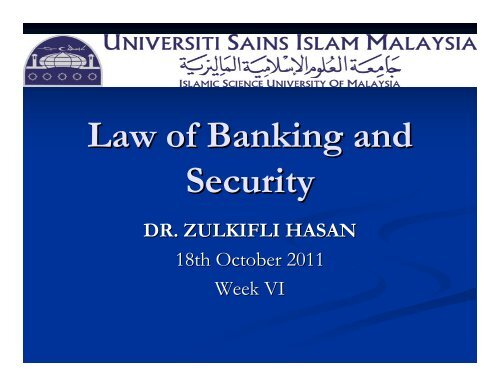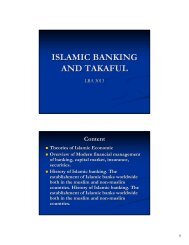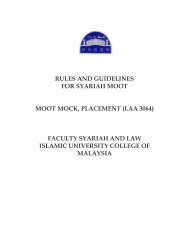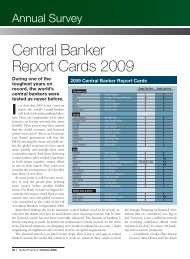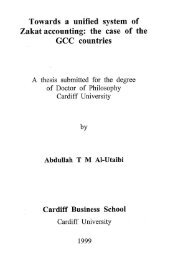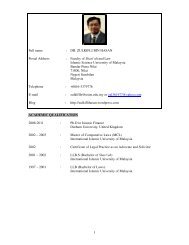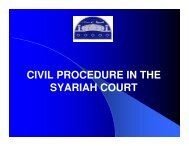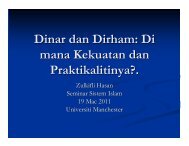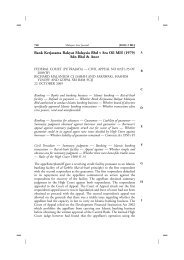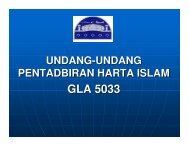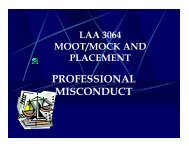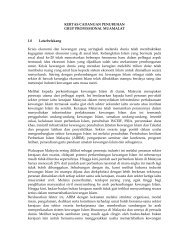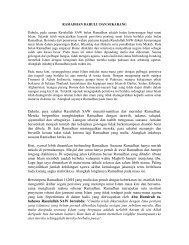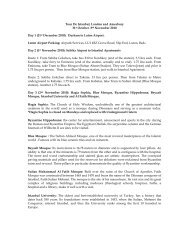Negotiable Instrument
Negotiable Instrument
Negotiable Instrument
You also want an ePaper? Increase the reach of your titles
YUMPU automatically turns print PDFs into web optimized ePapers that Google loves.
Law of Banking and<br />
Security<br />
DR. ZULKIFLI HASAN<br />
18th October 2011<br />
Week VI
Contents<br />
<strong>Negotiable</strong> <strong>Instrument</strong>s<br />
Bills of Exchange<br />
Cheques
<strong>Negotiable</strong> <strong>Instrument</strong><br />
Monetary instruments facilitate trade and<br />
commerce<br />
A formal legal document which contains a legal<br />
obligation to pay money and which possesses<br />
the attributes of negotiability.<br />
Negotiability: a form of transfer of property<br />
(ownership) from one person to another in a<br />
document evidencing a contractual obligation to<br />
pay money.
Types of <strong>Negotiable</strong> <strong>Instrument</strong>s<br />
<br />
<br />
<br />
<br />
<br />
<br />
<br />
<br />
<br />
<br />
<br />
BOE<br />
Cheques<br />
Promissory Notes<br />
Banker’s s draft, bank notes<br />
Treasury bills<br />
Share warrants<br />
Dividend warrants<br />
Debentures<br />
Traveller’s cheques<br />
Banker’s s acceptance<br />
<strong>Negotiable</strong> certificate of deposit
Bills of Echange<br />
BOE Act 1949:<br />
S3(1): is an unconditional order in writing<br />
addressed by one person to another signed by<br />
the person giving it, requiring the person to<br />
whom it is addressed to pay on demand or at a<br />
fixed or determinable future time a sum certain<br />
in money to, or to the order of, a specified<br />
person or to bearer.<br />
Cheque is by definition a BOE.
Term<br />
Drawer: A person who draws a bill (Customer)<br />
Drawee: : A person on whom it is drawn (Bank)<br />
Payee: Person to whom the bill is drawn payable<br />
Acceptor: When the drawee accepts a bill<br />
(bank).
Characteristics of BOE<br />
Unconditional Order<br />
In writing<br />
Addressed by one person to another<br />
Signed by the person giving it<br />
To pay on demand or at a fixed or determinable<br />
future time<br />
A sum certain in money<br />
To or to the order of specified person or to<br />
bearer
Unconditional Order<br />
Must be unconditional.<br />
Palmer v Pratt<br />
An order to pay at 30 days after the arrival of the<br />
ship was conditional.<br />
See also Cooperative Exportvereniging ‘Vecofa’<br />
UA V Maha Syndicate [1970] 1 mlj 187
In writing<br />
S3 MIA 1967: Printing, photography and any<br />
other mode of representing words in visible<br />
form.<br />
May be drawn in any language<br />
See Arab Bank Ltd v Ross [1952] 2 QB 216
Addressed by one person to another<br />
Drawer (customer) to drawee (banker)<br />
Bank drafts drawn by a bank on itself are not<br />
BOE
Signature<br />
Signature is vital.<br />
Liabilities are depending on this requirement
To pay on demand or at a fixed<br />
determinable future time<br />
Mandate<br />
Ordinary cheques: : payable on demand<br />
Some cheques: : payable at a fixed or<br />
determinable future time
To or to the order of specified person<br />
or to bearer<br />
To specified person: Must be named and certain<br />
To bearer: simply paid to the bearer without<br />
requiring proof of identity.<br />
‘cash or order’<br />
Account payee only: a cheque can only be paid into<br />
the account of the person name on the cheque, , the<br />
payee.
Cheques<br />
A document/instrument that orders a payment<br />
of money from a bank account.<br />
BOE 1949: A BOE drawn on a banker payable<br />
on demand.
Issuing Cheques<br />
Section 2-2<br />
issue means the first delivery of a bill complete in<br />
form, to a person who takes it as a holder.<br />
Mere signing and fills in the blanks, not a valid cheque.<br />
Section 2 defines ‘holder as the payee or indorsee of a bill who is<br />
in possession of it/bearer.<br />
Payee is the person to whom the cheque is drawn payable<br />
Indorsee is the person to whom the cheque is made payable by a<br />
special indorsement.<br />
Section 2 defines delivery- transfer of possession,<br />
actual/constructive from one person to another<br />
Section 21(2)- delivery may be conditional or for a special<br />
purpose only. It is not for the purpose of transferring the<br />
property in the cheque.
Dating a Cheque<br />
No legal requirement<br />
In practice, the drawee refuses to pay and return<br />
it with the answer “date required”.<br />
Antedated cheque: : Bears a date before the date<br />
of issue.<br />
Postdated cheque: : dated later than the date of<br />
issue.
Postdated Cheque<br />
It is a valid BOE and capable of being<br />
transferred.<br />
Lien Chung Credit & Leasing Sdn Bhd v Chang Chin<br />
Choi [1994] 3 MLJ 488<br />
Postdated cheque RM35K as a security for the<br />
loan.<br />
Post dated cheque was not a cheque (not payable on<br />
demand).<br />
It was not a security.
Negotiation of cheques<br />
If there is word ‘only’- the cheques are incapable of<br />
negotiation<br />
Section 8(4)- a cheque payable simply to a specified<br />
person without the addition of the words ‘or order’<br />
is negotiable in the usual way<br />
Section 81A : a cheque crossed ‘account payee/AC<br />
payee shall not be transferable but shall only be<br />
valid between the parties.<br />
Section 31(1) i) Payable to bearer: negotiated by<br />
delivery alone ii) Payable to order: negotiated by<br />
the indorsement of the holder completed by the<br />
delivery
Crossing on Cheques<br />
Construed as a request to the drawee bank to exercise<br />
caution in the payment of cheques.<br />
General Crossing:- S76(1) a crossing 1. an addition to a<br />
cheque 2. made across its face and by means of two<br />
parallel transverse lines.<br />
Payment can made to another banker<br />
Special Crossing- 1. an addition to a cheque 2.<br />
comprising the name of a banker 3. with or without<br />
words ‘not negotiable’.<br />
Payment can only be paid to the banker named in<br />
the crossing
A/C Payee Crossing<br />
A cheque crossed ‘account payee’ is non-<br />
transferable.<br />
Sole duty of a banker to pay an A/C payee<br />
cheque into the named payee’s s account.<br />
If the collecting banker fails to observe this<br />
duty, it is considered as negligent on the part of<br />
the bank.
Crossing with the Words A/C payee only
Crossing with the words Not <strong>Negotiable</strong>
Indorsement<br />
<br />
<br />
<br />
<br />
<br />
<br />
Section 34(1) Blank indorsement<br />
Section 34(2) special indorsement<br />
Section 32(a) 82 of the Bills of Exchange Act- the signature<br />
of the holder or of his duly authorised agent is essential to<br />
the validity of indorsement<br />
Section 32(b) – partial indorsement, , does not operate as<br />
negotiation of an instrument<br />
Section 32(d)- he may indorse the instrument as described-<br />
he may add, if he thinks fit, his proper signature<br />
See Arab Bank Ltd v Ross [1952] Court of Appeal: the<br />
omission of the word company made the indorsement<br />
irregular
What is Indorsement?<br />
National Bank v Paterson (1909) a South African<br />
case attempts to define indorsement:<br />
Every signature written on the back of such instrument<br />
is an indorsement<br />
Ordinary legal meaning is the signing of a name on the<br />
back of an instrument (intention to take liabilities of an<br />
indorser)<br />
Last-named sense followed by delivery
Indorsement
Indorsement<br />
United Asian Bank Bhd v Tai Soon Heng<br />
Construction Sdn Bhd<br />
Tai, was a customer to UAB and had opened an<br />
account at UAB’s branch in KL. UAB’s account<br />
clerk who was not an authorized signatory to<br />
cheques, forged several cheques of Tai. All these<br />
cheques were honoured by UAB and Tai’s<br />
account with it was debited in consequences. Tai<br />
brought an action against UAB after forgery was<br />
discovered.<br />
Issue: whether banker should be held liable?
Anuar J: a customer need to establish on balance<br />
of probabilities<br />
Liability of a bank for payment on forged<br />
instruments of its customers is founded on the<br />
tort of conversion, tort of strict liability<br />
Duties of a customer a) to refrain from drawing<br />
a cheque which may facilitate forgery b) to<br />
inform the banker of any forgery of a cheque as<br />
soon as the customer becomes aware of it. Duty<br />
to inspect his periodical bank statements<br />
Appeal dismissed


